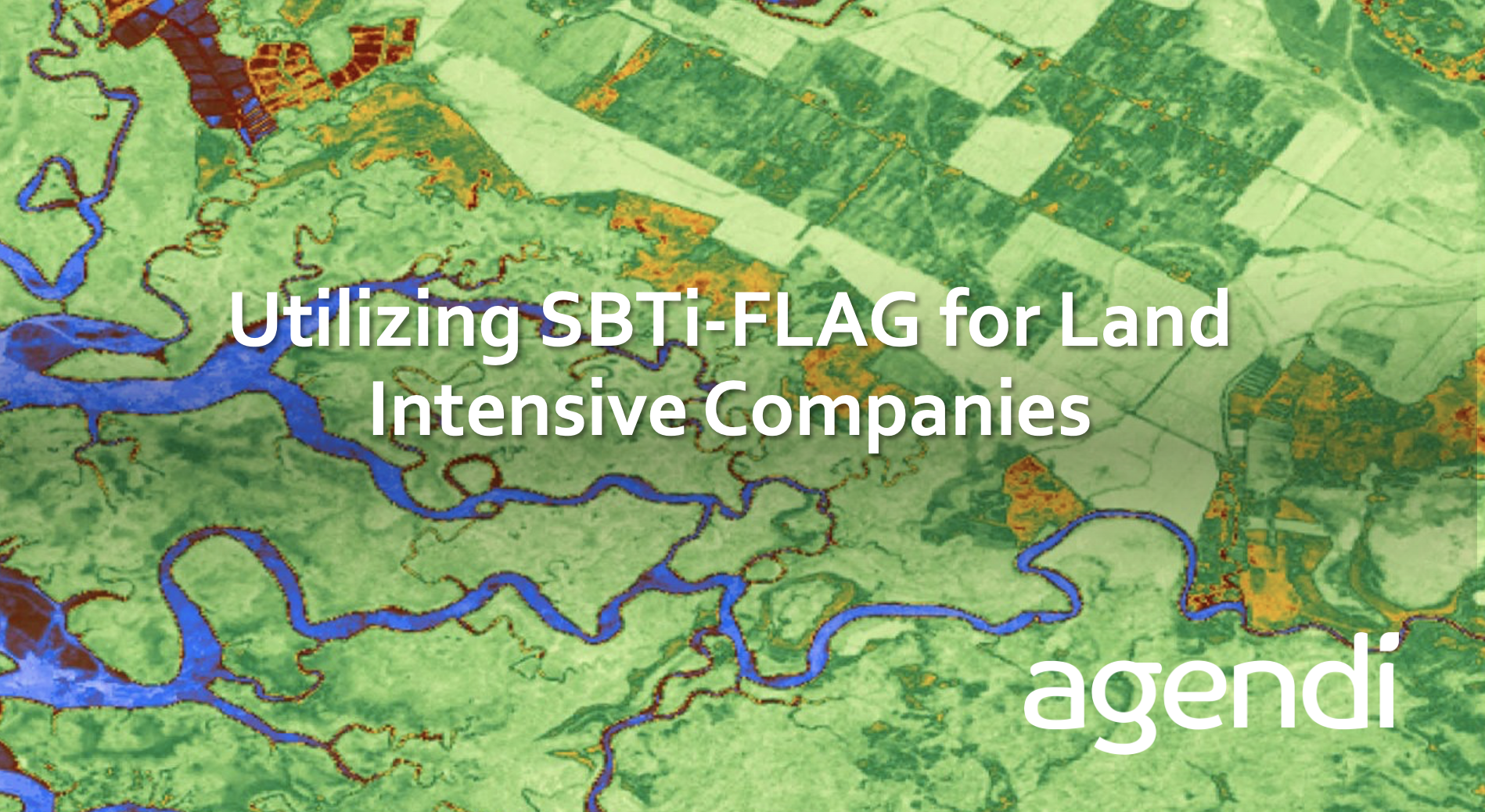Land-intensive companies required to submit land-based emissions and emission reduction targets under SBTi-FLAG
15 Dec 2022 The new SBTi-FLAG guidance, coupled with new land sector and carbon removal accounting guidance from the GHG protocol, makes it easier for companies to account for their land-based emissions and set more accurate science-based targets.
The new SBTi-FLAG guidance, coupled with new land sector and carbon removal accounting guidance from the GHG protocol, makes it easier for companies to account for their land-based emissions and set more accurate science-based targets.
Many AFOLU (Agriculture, Forestry, and Other Land Use) companies already report on their carbon emissions and set science-based targets; however, prior guidance did not have an explicit focus on land intensive industries. AFOLU is the largest GHG emitting sector after energy, responsible for approximately 24% of anthropogenic GHG emissions mainly from agricultural emissions from livestock and soil and nutrient management and deforestation. According to the IPCC , the sector is unique given that emissions can be mitigated through both land management and land use emission reductions and carbon removals. The sector is both a source of carbon emissions (that can be reduced) and a carbon sink to sequester carbon (that can be increased).
The SBTi (Science Based Targets initiative) is a global body enabling companies to set ambitious carbon emission reduction targets in line with the latest climate science – its focus is to accelerate companies globally to halve emissions before 2030 and achieve net zero emissions before 2050. The SBTi-FLAG (Forest, Land, and Agriculture) tool and guidance was released in September 2022 and supports companies in measuring their land-based emissions and setting science-based targets for the reduction of forest, land, and agriculture based GHG emissions (including CO2, N2O, and CH4). FLAG guidance provides the first standard method for companies in land-intensive sectors to set science-based targets that include land-based emission reductions and removals.
Prior target-setting guidance did not have an explicit focus on land-based emissions. With SBTi-FLAG, land-intensive companies now have this guidance – FLAG focuses on emissions that are forest-, land-, or agriculture-based, resulting from land use change (LUC) or land management practices, provides specific target-setting decarbonization pathways to reduce these emissions, and provides guidance on carbon storage and removals.
LUC emissions result from biomass and soil carbon loss from deforestation, forest degradation, intensive agricultural production, wetland and coastland conversion, and peatland burning. Land management emissions are all other activities not related to land use change including emissions from manure management, fertilizer use, crop residues, agricultural waste burning, the use of farm machinery, and emissions from fertilizer production (primarily N2O (nitrous oxide) and CH4 (methane)). Biogenic carbon removals and storage – carbon that is stored in biological materials such as plants or soil – is a key component of FLAG and includes carbon sequestration from improved forest management, agroforestry, improved soil management, reforestation, and ecosystem restoration. SBTi FLAG’s carbon removals are defined in coordination with the Greenhouse Gas Protocol (GHG Protocol) Land Sector and Removals accounting guidance (draft guidance available now, to be finalized in 2023).
FLAG Target setting – Who and When? SBTi requires that you set land-based targets if you are in the following land-based sectors, have 20% of your revenues coming from land-based activities, or total FLAG-related emissions that are more than 20% of overall emissions across scope 1, 2, and 3. The land-based sectors are forest and paper products, agricultural food production, animal source food production, food and beverage processing, food and staples retailing, and tobacco. Companies that fall into the above categories, and are in the process setting targets, will be required to include FLAG targets beginning in September 2022.
Target-Setting Requirements. The FLAG target must encompass at least 95% of FLAG related scope 1 and 2 emissions and must cover at least 67% of FLAG related scope 3 emissions. Note that FLAG and non-FLAG emissions are accounted for separately. FLAG base year emissions must be calculated using the GHG Protocol’s new Land Sector and Removals Guidance when it becomes available.
Set FLAG targets now despite data limitations. Capturing high quality data is difficult. Acknowledging this, SBTi urges that land-based companies set science-based targets as soon as possible, regardless of data quality limitations. Targets can be in place while companies continue to improve data collection and data quality.
Zero-Deforestation Commitments. In addition to accounting for land-based emissions, SBTi requires that companies publicly commit to zero deforestation across their value chain and recommend that companies also set a zero-land conversion (natural lands other than forested) target.
Companies benefit from setting FLAG targets. Reducing land-based emissions is critical to tackling climate change. Key drivers of land-based decarbonization include the reduction of the emission intensity in agriculture and forestry and boosting carbon sequestration. SBTi-FLAG, coupled with the GHG Protocol guidance for the land sector, enables companies to better understand, measure, manage, and reduce their land-based emissions, while also better understanding the ways to enhance carbon removals. Conducting a complete land-based GHG inventory across all scopes and setting science-based GHG emission reduction targets enable companies to better understand and manage their carbon risks and opportunities and enhances transparency for stakeholders such as investors, regulators, and consumers.
If your company engages in land-based operations join Agendi to stay up to date on these emerging developments and how they will impact your data collection, reporting, and standard setting activities.
Return to News
